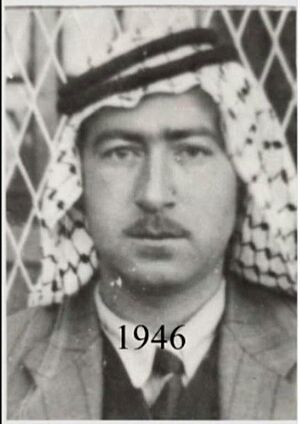Suleiman Mousa facts for kids
Quick facts for kids
Suleiman Mousa
سليمان الموسى |
|
|---|---|
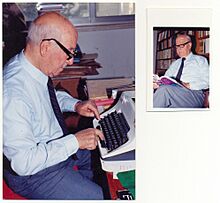 |
|
| Born | 11 June 1919 Al Rafeed, Occupied Enemy Territory Administration
|
| Died | 9 June 2008 (aged 88) Amman, Jordan
|
| Nationality | Jordanian |
| Occupation | Writer / Historian |
| Years active | 1935 until his death |
|
Notable work
|
T.E. Lawrence: An Arab View, History of Jordan in the 20th century, Biography of Sherif Hussein Bin Ali, Jordan in the 1948 War, The Great Arab Revolt |
| Spouse(s) | Georgette Nuseir |
Suleiman Mousa (Arabic: سليمان الموسى) (born June 11, 1919 – died June 9, 2008) was a famous Jordanian writer and historian. He was born in Al-Rafeed, a small village near Irbid. He wrote about 50 books.
Some of his most important books include Biography of Sharif Hussein Bin Ali, Jordan in the 1948 War, and The Great Arab Revolt. He also wrote History of Jordan in the 20th century. Suleiman Mousa was the first and only Arab writer to tell the Arab side of the story about Lawrence of Arabia.
His book T.E. Lawrence: An Arab View came out in 1966. It was translated into English, French, and Japanese. He wrote it because he felt that other books about Lawrence made his role in the Arab Revolt seem too big. He wanted to show how important the Arabs themselves were in the revolt.
Contents
Early Life and Education
Suleiman Mousa was born into a Christian family in Al Rafeed in 1919. This village is close to the Yarmouk River. When he was only six years old, his father passed away. His father loved reading and writing, but didn't leave much money. His mother worked hard to support the family. They lived a simple life, like most people in their village who farmed for a living.
Suleiman first learned from religious teachers. Then, he went to a small school called Al Ta'ifa for three years. His mother wanted him to get a good education, so he went to a government school in Al Husn. He lived with relatives there. In 1934, at age 15, he had to stop school because his family didn't have enough money. A few months later, he started working as a teacher in Irbid.
Working and Writing Journeys
In 1936, Suleiman Mousa traveled to Haifa in Palestine for his first job. After a short time teaching again in Irbid, he took a train to Jaffa. This train was part of the Hejaz Railway, built by the Ottoman Empire. This trip was very important for his love of learning. He started borrowing and buying many books. He taught himself English using dictionaries.
By 1938, he was publishing articles in Palestinian newspapers and writing short stories. He became more interested in history, literature, and poetry.
In 1939, he went back to Al Rafeed and continued teaching. Later, he worked for the Iraq Petroleum Company in Mafraq. In 1943, he married Georgette Nuseir, whom he had met in Nazareth. He lived in Mafraq for 15 years. During this time, he didn't publish much because the area wasn't very supportive of writers. Still, he managed to publish some short stories and translations.
A big change happened in 1957 when he moved to Amman, the capital of Jordan. He started working for the Jordanian Broadcasting Company and later for the Ministry of Information and Culture. He was the editor of the Jordanian magazine ‘Resalat Al Ordon’ from 1966 to 1967. From 1984 to 1988, he was a cultural adviser for the Greater Amman Municipality (GAM).
Becoming a Famous Historian
Suleiman Mousa's first book, Al Hussein Bin Ali and the Great Arab Revolt, was published in 1957. He actually wrote it much earlier, in 1939, when he was only 19 years old and living in Jaffa. It took almost 17 years for the book to be printed!
One of his most important books is T.E. Lawrence: An Arab View. This book made him famous around the world. It was translated into English, French, and Japanese. In this book, he shared the Arab perspective on the battles and events of the Arab Revolt. He wrote it to respond to books by Lawrence himself, which he felt didn't fully credit the Arabs.
Suleiman Mousa showed that Arabs fought bravely and in large numbers against the Turkish rule to gain their independence. He explained that Arabs were the main fighters, and Lawrence was just one officer in the British Army.
He became very interested in English history books while living in Jaffa in 1937. He bought important books like The Seven Pillars of Wisdom by Lawrence and The Arab Awakening by George Antonius.
Suleiman Mousa believed that Arab writers should learn another language to connect with other cultures. He wrote:
An Arab writer must, with no doubt, know a language – in addition to his mother tongue – if he wishes to keep up with the course of world cultures and interact with them.
The Impact of T.E. Lawrence: An Arab View
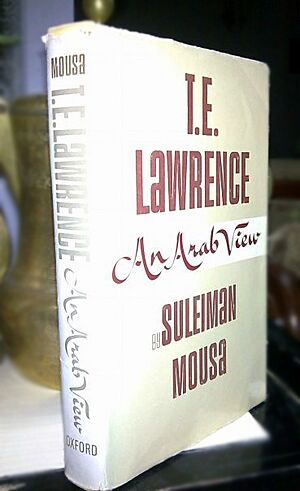
One of Suleiman Mousa's articles, "Lawrence on the balance," published in 1955, gained a lot of attention. It discussed a book about Lawrence by Richard Aldington. Because of the success of this article, Suleiman Mousa decided to write a whole book from an Arab point of view.
Five years later, the Arabic version of T.E. Lawrence: An Arab View was published. The English translation followed in 1966, French in 1973, and Japanese in 1988. Dr. Albert Boutros, an English professor, translated the book into English. Suleiman Mousa used many Arab and Western sources for his research. Important Western writers, like Colin Wilson and Jeremy Wilson, even visited him.
To this day, his book is the only one that truly shows the Arab viewpoint. It has had a big impact on researchers who study Lawrence. The book is now known worldwide and is a key reference for understanding Lawrence and the Great Arab Revolt.
The book is even taught at universities like the University of Oxford in Britain. Professor Eugene Rogan from Oxford said in 2000 that Suleiman Mousa's books are very valuable for studying the Middle East. He also called Days unforgotten: Jordan in the 1948 war the best book written in Arabic about that conflict. He thanked Suleiman Mousa for his great contributions to Jordanian history.
Contributions and Recognition
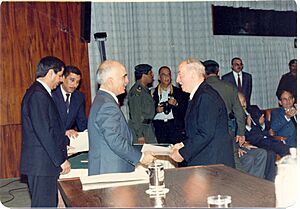
Suleiman Mousa was a respected researcher in the Arab World and beyond. He wrote about four main topics: biographies of important people, the history of Jordan, the history of the Arab revolution, and literature and short stories. He also translated books and wrote simpler books for young people.
He used many different sources from Arab, British, and other countries. In 1974, he spent four months in the United Kingdom, researching documents about Jordan. Because of his thorough work, his books are essential for students and researchers today.
Suleiman Mousa received many awards for his work on Jordanian and Arab history. These include:
- The Order of Independence in 1971
- The King Abdullah I Award for research in Islamic civilization in 1988
- The State Incentive prize in 1990
- The Order of Al Hussein distinguished first class in 2007
- The Medal of the Arab Author, given after his death in 2008.
Later Life and Legacy
Suleiman Mousa passed away on June 9, 2008, in Amman, Jordan, just two days before his 89th birthday. He died from congestive heart failure. Many cultural leaders, government representatives, and media members attended his funeral and wake, praising his important work.
Even after his death, many projects were started to honor Suleiman Mousa's contributions to history. One of the most important is the Library of Suleiman Mousa. His complete works are also being republished to help new generations learn about history. He was also given The Arab Author Medal in 2008.
Library of Suleiman Mousa
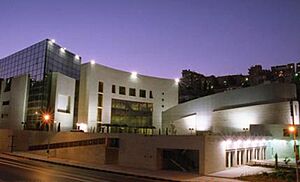
On November 11, 2009, a library named after Suleiman Mousa was opened at the Al Hussein Cultural Center in Amman. This library focuses on the history of Jordan.
The library has different sections. One section has books about Jordan's history in Arabic, English, and French. Another section holds Suleiman Mousa's personal books and documents, which his family donated. The library is open to all readers and researchers. It has modern facilities, including internet access and international magazines.
The library often welcomes students from schools and universities. They learn about Middle Eastern history through documentaries, photos, and books. The library also hosts scientific talks and conferences. Its goal is to become a major center for learning about Arab history and the history of Jordan.
Works
In Arabic
- History of Jordan in the twentieth century – Part I.
- History of Jordan in the twentieth century - Part II.
- Days Unforgotten: Jordan in the 1948 war.
- The Arab Movement.
- Historical Correspondence from 1914 to 1918.
- Historical Correspondence - Volume II, 1919.
- Historical Correspondence - the third volume from 1920 to 1923.
- Characters of Jordan - Wasfi, Hazaa, Al-Nabulsi.
- Characters of Jordan – Al-Rai Library, Abu Al-Huda and Mufti.
- Western Views.
- O Jerusalem.
- T.E Lawrence: An Arab View - was translated and published in English 1966, Oxford University Press,(ASIN B000OGOYN4), French 1973, Japanese 1989
- The Great Arab Revolt - The war in Hijaz from 1916 to 1918.
- Monuments of Jordan.
- Faces and Features – Part I.
- Faces and Features - Part II.
- Westerners in Arab Countries.
- Jordan and Palestine – Part I.
- Jordan and Palestine - Part II.
- Throughout Jordan.
- The Great Arab Revolt - and the documents and arguments.
- The Establishment of the Emirate of Jordan - 1921-1925, First Edition 1971.
- Notes, Prince Zeid - the war in Jordan, the first edition 1976.
- Images of the championship, the first edition 1968.
- Folded pages.
- Jordan contemporary political history of 1967-1995, the date of publication of the Commission of Jordan.
- Studies in Jordan's modern history - Book of the month.
- Al-Hussein Bin Ali and the Arab Revolt - a series of reading books, first edition 1957.
- East of the Emirate of Jordan 1921-1946
- The Other Side.
- The Days Notes.
- That Unknown Soldier.
- The Perfect Wife.
- Eighty: An Autobiography
- Steps on the Road.
- Jordan's capital Amman.
- Of our modern history - a book in the history of Jordan
- Arab Revolt - the causes and the principles and objectives.
- East of Jordan - before the founding of the emirate.
- Memories of the scenes.
- Pages of Jordan's modern history.
- For the Sake of Freedom.
- Al-Hussein Bin Ali.
- The Great Arab Revolt.
In English
- Cameos: Jordan and Arab Nationalism
- Land and People: Jordan, a Historical Sketch, 1921-1973
Images for kids
 | James Van Der Zee |
 | Alma Thomas |
 | Ellis Wilson |
 | Margaret Taylor-Burroughs |


